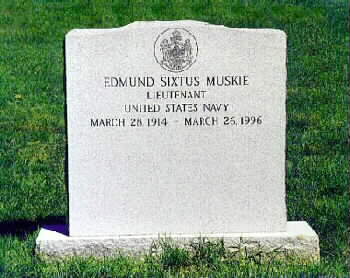Contemporary press report:Former Secretary of State Edmund Sixtus Muskie died early Tuesday (March 26, 1996) at Georgetown University Hospital from heart failure.
The longtime Maine senator, known as “Mr. Clean” for his efforts to curb air and water pollution, was 81.
Muskie underwent successful surgery last week to clear a blocked artery in his leg, but suffered a heart attack and a stroke while still in the hospital, said his assistant, Carole Parmelee from the Chadbourne & Parke law firm.
Hospital spokeswoman Lauren Shaham said Muskie died at 4:06 a.m. EST (0906 GMT) — just two days before his 82nd birthday.
Muskie received a law degree from Cornell University, served in the Navy in World War II, and entered politics in the Maine Legislature before becoming the state’s governor in 1955.
He was a Maine senator from 1959 to 1980, and was the first elected Democratic U.S. senator in Maine’s history. Before his tenure in the Senate, Muskie was governor from 1955 to 1959.
In 1972, Muskie was the early front-runner as a Democratic presidential hopeful, but he lost the nomination to George McGovern. Muskie’s career as a politician ended as secretary of state under Jimmy Carter in 1980-81.
Muskie considered it ironic that his final months in public life were spent in that office, working for a president.
“It’s funny,” he once confided to an interviewer. “Of all the jobs I’ve been ambitious for, this is one that never crossed my mind.”
Muskie, a World War II veteran, first gained national prominence in 1968, when Democratic presidential nominee Hubert Humphrey chose him as running mate.
Though the Democratic ticket lost to Richard Nixon and Spiro Agnew, Muskie captivated the nation, sometimes inviting hecklers to share the speaking platform with him.
With his lanky 6-foot-4 frame, his craggy appearance and his modest manners, Muskie caught the imagination of political analysts, who dubbed him “Lincolnesque.”
Blessed with a dry sense of humor, an outgoing personality and eloquent speaking abilities, Muskie emerged in 1972 as the early favorite to win the Democratic nomination. But he lost presidential ground one snowy Saturday while campaigning for the New Hampshire primary.
Speaking from a flatbed trailer outside the Manchester Union Leader newspaper, Muskie denounced a story critical of his wife, Jane, then openly wept.
Although he won the New Hampshire primary, the episode came to symbolize the collapse of Muskie’s quest for the White House.
“It changed people’s minds about me, of what kind of guy I was,” he later told author Theodore H. White. “They were looking for a strong, steady man, and here I was weak.”
Muskie was born in the small paper mill town of Rumford, Maine, on March 28, 1914. His father was a Polish-born tailor whose name had been shortened by immigration officials from Marciszewski to Muskie.
Muskie was a leading voice on domestic issues during his 22 years in the Senate, and was known for his hard-line environmental stances.
During the mid-1970s, he became the champion of fiscal discipline as Congress created its own budget-making process. Rarely would Muskie flinch on issues. “Too often in the past, members of Congress have won re-election with a two-part strategy: Talk like Scrooge on the campaign trail. Vote like Santa Claus on the Senate floor,” he once said.
He now lies in Arlington National Cemetery.
Tuesday, December 28, 2004
AUGUSTA, Maine – Jane Gray Muskie, whose husband Edmund Muskie’s 1972 presidential campaign collapsed after he defended her honor with what appeared to be tears in his eyes, has died. She was 77.

Muskie, who suffered from Alzheimer’s disease, died at her home in Bethesda, Maryland, on Saturday, Maine Governor John Baldacci said.
Muskie accompanied her husband during his rise in Democratic politics from the Maine Legislature to the governor’s house, the U.S. Senate and to President Jimmy Carter’s Cabinet as secretary of state. Edmund Muskie died of a heart attack in 1996 at 81.
“When you’re married to someone who is in political life, you’re as much a politician as your spouse,” said Edmund Muskie Jr., the couple’s son. “She actively participated in their campaigns and the issues they both cared about.”
While running in the 1972 New Hampshire primary, then-Senator Edmund Muskie denounced the conservative Union Leader newspaper of Manchester for reprinting an uncomplimentary Newsweek editorial that said she liked to tell dirty jokes and smoke cigarettes.
Edmund Muskie choked up several times during the speech, and several news organizations reported that he cried, but a dispute has persisted for years whether it was tears or melted snowflakes on his face.
The campaign never recovered, and then-Senator George McGovern went on to win the nomination and lose the general election to President Richard Nixon.
“I was right at Muskie’s shoes, so at the time he sort of chokes up, I’m doing the old wire service thing of watching carefully for tears because I know it’s important for us to say, `Did he cry or didn’t he?'” John Milne, then New Hampshire bureau chief for United Press International, recalled following Edmund Muskie’s death. “And I don’t think he did.”
Jane Gray was born in Waterville, Maine, and married Edmund Muskie in 1948, two years after he had been elected to the Maine House of Representatives.
Edmund Muskie was elected governor in 1954, then senator four years later, moving his family to Washington. He gained national prominence in 1968 when Democratic presidential nominee Hubert Humphrey chose him as running mate. They lost to Nixon and Spiro Agnew.
The couple had five children.
Family members said Jane Muskie will be buried next to her husband at Arlington National Cemetery.
Tuesday, December 28, 2004
AUGUSTA, Maine — Gov. John Baldacci on Tuesday offered condolences to the family of Jane Gray Muskie, widow of former Secretary of State Edmund Muskie, who died at her home outside Washington.
The governor and his wife Karen Baldacci called Mrs. Muskie a devoted and gracious first lady whose “optimism inspired her family and all who knew her.”
Mrs. Muskie, who was 77, had been diagnosed with Alzheimer´s disease before she died on Christmas Day.
A Waterville native, she married Muskie in 1948 and accompanied her husband during his rise in politics from the state Legislature to the Blaine House, the U.S. Senate and finally to President Jimmy Carter´s Cabinet as secretary of state.
The Muskies brought their children to the Blaine House in Augusta after he was elected governor in 1954. During his four years as governor, the Muskies had another child.
While running for president in 1972, then-Sen. Edmund Muskie took issue with a New Hampshire newspaper´s criticism of his wife. Standing in the snow outside the Manchester Union Leader, Muskie called the paper´s publisher a “gutless coward.” Muskie´s campaign flagged after the confrontation.
“When you´re married to someone who is in political life, you´re as much a politician as your spouse,” said Edmund Muskie Jr., who at 43 is the youngest of the Muskie children. “She actively participated in their campaigns and the issues they both cared about.”
Carol Parmelee, a longtime executive assistant to Edmund Muskie, said Mrs. Muskie was a great campaigner and “the power behind the scenes for him.”
“She was warm. She was outgoing. She remembered everyone´s name. She was an incredible asset,” said Parmelee.
After Muskie´s election to the Senate in 1958, the family moved to Washington. Later in their lives, the Muskies divided their time between Bethesda, Md.., and Kennebunk, Maine. Edmund Muskie left public life in 1981 and died in 1996 at age 81.
Funeral arrangements were incomplete, but family members said Mrs. Muskie will be buried next to her husband at Arlington National Cemetery outside of Washington.
NOTE: The Senator’s daughter, Martha Muskie, died on 2 January 2006, and will be buried next to her parents on 20 January 2006.
Michael Robert Patterson was born in Arlington and is the son of a former officer of the US Army. So it was no wonder that sooner or later his interests drew him to American history and especially to American military history. Many of his articles can be found on renowned portals like the New York Times, Washingtonpost or Wikipedia.
Reviewed by: Michael Howard

